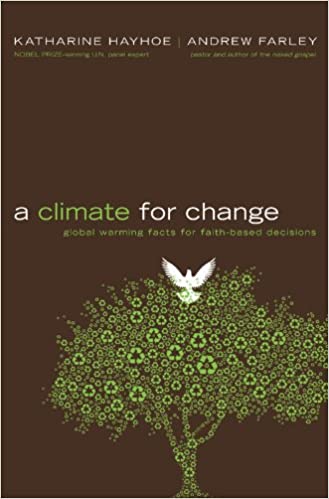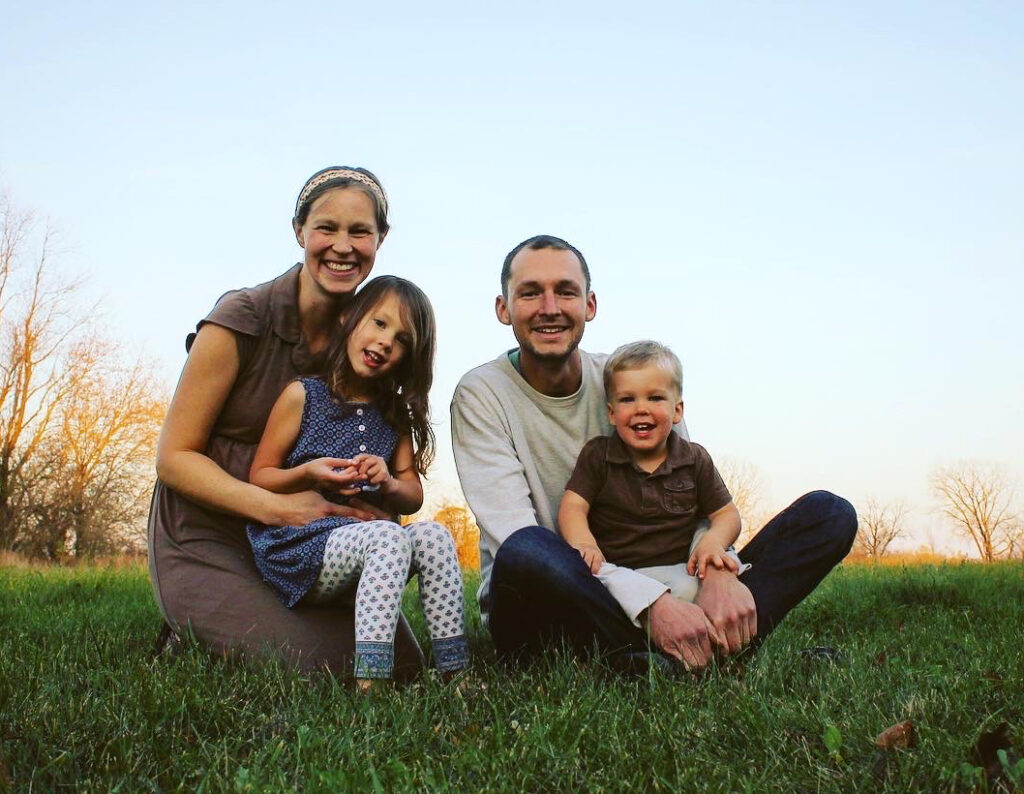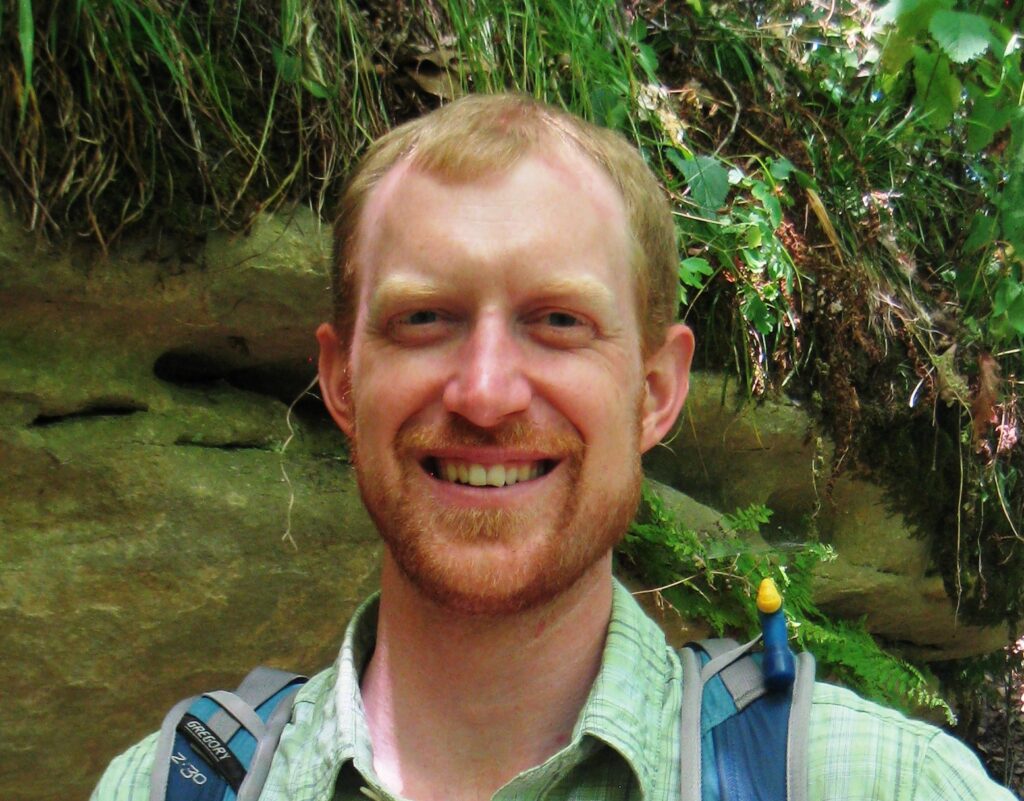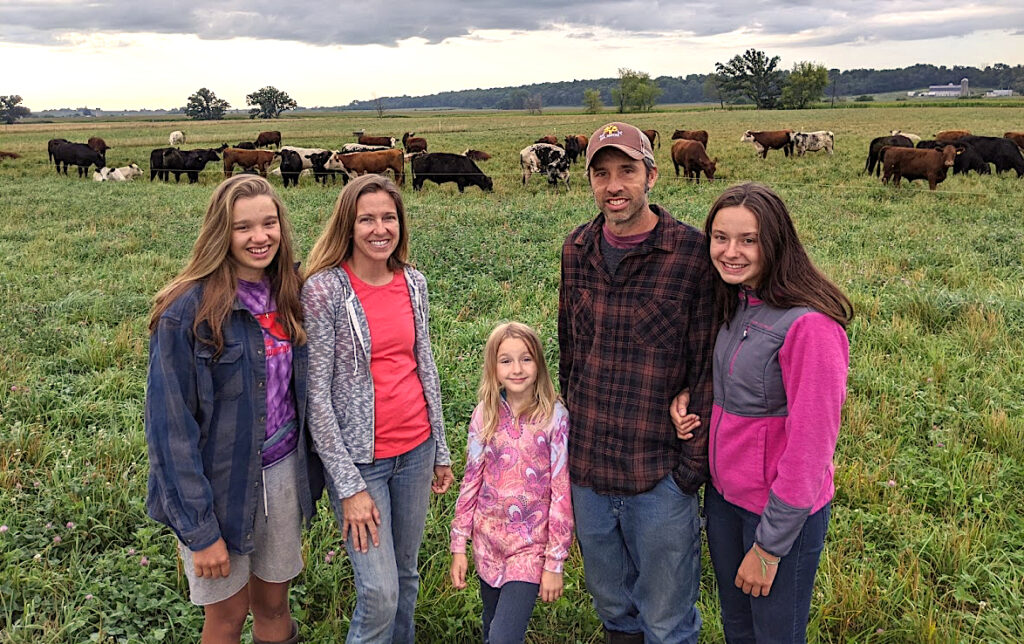
This interview with the Riemer family (from left to right: Elli, Jen, Caroline, Bryce, and Kalena) is something I’ve wanted to do for some time. We connected some time ago around faith and farming, and that connection has been a great blessing to my family and me. They hosted the first gathering I wanted to organize of Christians who care about God’s earth. They’ve been good friends. They even hosted our younger son for several days of farm work that I “voluntold” him for. I don’t know if he was initially thrilled about the idea but he came to enjoy the work, their family, and their hearty cooking.
It’s a bit easy for a person like me to be convinced in theory that a whole Christian faith-life can’t help but include a commitment to doing all that is possible to enable God’s earth to thrive. That’s because I’m not a farmer. Farmers are working squarely at the intersection of the human economy and God’s earth. Their ability to make a living, to put food on the plates of their children, depends on their success at producing food that people will buy. When farmers like the Riemers decide to honor God in how they raise food, even if that means not following the mainstream food system, they are testing their faith in the real world.
But that is what the Riemers have been doing. So I wanted to share their experiences and insights of what that is like. This interview is about God-honoring farming. And it’s much more. It’s also about the courage of a family to live out their faith. It’s about glimpses of the abundant life that this world can sustain when people truly reflect God’s image. it’s about being pushed to the limit by the forces of the market that often drive us away from God’s ways. And there’s that empty, lonely feeling that you probably know, too, of being aware that many Christians don’t seem to care about Creation.
I hope you’ll take the time to read this. I also hope you’ll pray for their ongoing success. You can learn more about Riemer Family Farm in Brodhead, Wiscsonsin, here.
(By the way, you can learn much more about their farm business history and how exactly they farm by listening to this edition of the Edible-Alpha podcast. I’m also embarrassed to admit that this interview took place in 2020 during the fall. It’s taken some time for me to complete the transcription and condense it down a bit. So, here in the middle of winter, you will read of sheep, cows, pigs, and monarchs all thriving on a farm. I appreciated, too, that Bryce and Jen wantd thier three daughters to be part of the interview. And one last thing – we are grateful to Anastasia Wolf-Flasch for allowing us to use all of the images she took of the Riemer family and their farm.)
Nathan: In the Edible-Alpha podcast that you did with Tera Johnson, you shared a great deal about the growth and evolution of your business from a sustainable farming and entrepreneurial perspectives. Can you talk more about what role your faith had in how your business has evolved? How has it shaped your decisions and helped get you through tough times?
Bryce: Our faith shapes our business, because it shapes who we are in our business. Our business is kind of an outflow of who we are as people. Jen and I, as a married couple, just keep looking at the gifts he’s given us and the resources he’s given us and just keep asking, “What do we do with our lives? What direction is Jesus taking us together?” And that whole thought process is the process that got us to where we are today.
This business is the best way that Jen and I believe we can use all of our, the gifts, the resources that God gave us to make a big impact on people that we wouldn’t otherwise be able to do.
Kalena: I probably wouldn’t be able to have the same mindset going out every day and doing the work without faith.
Jen: Well, I think faith was a big part in us getting started with our philosophy of farming with the very deep need to care for Creation and not just grow a commodity, which is not environmentally sound nor very profitable nor very fun. I think that God puts us here to enjoy our work. It’s not supposed to be a slog, although it’s hard work. We set out with the holistic point of view that if we’re going to do this, it’s going to honor God. And it’s going to be something that honors Creation, because that’s what we’re all about.
I think that’s the filter through which we make decisions. Obviously from a marketing perspective, that’s what our customers expect from us. But, we continue to uphold that integrity because we’re Christians and because we’re not going to say something and do something different. That’s our ethics.
Nathan: I know as part of your transition, you were farming Bryce’s parents’ land that had been in more conventional production. Did your faith also help shape how you communicated with your parents and did that transition?
Bryce: Well, obviously, we started with the concept of honoring your parents. There were times early on where there was a lot of tension, because we were changing stuff and Dad wasn’t comfortable with that. So it took patience and valuing relationships over the work or over things. That’s why it’s so hard for a lot of farms to transition to the next generation – they fight about stuff and forget about the relationship.
Jen: And then they lose their relationship with their parents.
Nathan: Can you briefly describe what it is about your farming that benefits or sustains creation?
Elli: When God created the world, he had the cattle grazing. There were no commodity crops and that’s what He wanted it to be. And that’s what He wants it to be still. So we try and mimic the best practices that we could be using while trying to respect the nature of the animal. If the pig is able to root, it is obviously more happy. We don’t humanize our animals. We don’t give them all names and all that, but if they get to express their innate nature, then I feel like that’s honoring God, honoring the pigness of the pig.
Caroline: Except when they get out!
Jen: It’s a lot harder to deal with animals when you’re grazing them. There have been moments where I thought, “Oh, this is why people have CAFOs and feedlots, because the farmer’s day is easy. You just run your machine and feed them and you’re done.”
Bryce: Moving the cattle is very peaceful. We had hundreds and hundreds of monarch butterflies come through here again this year. Even after the cattle graze – they don’t eat it all – there’s still clover there for the monarchs. It’s just the interrelatedness of everything. It just feels like a spiritual experience. And it’s way more a spiritual experience than you would get trying to get the animals to do something that they weren’t supposed to do in the first place.
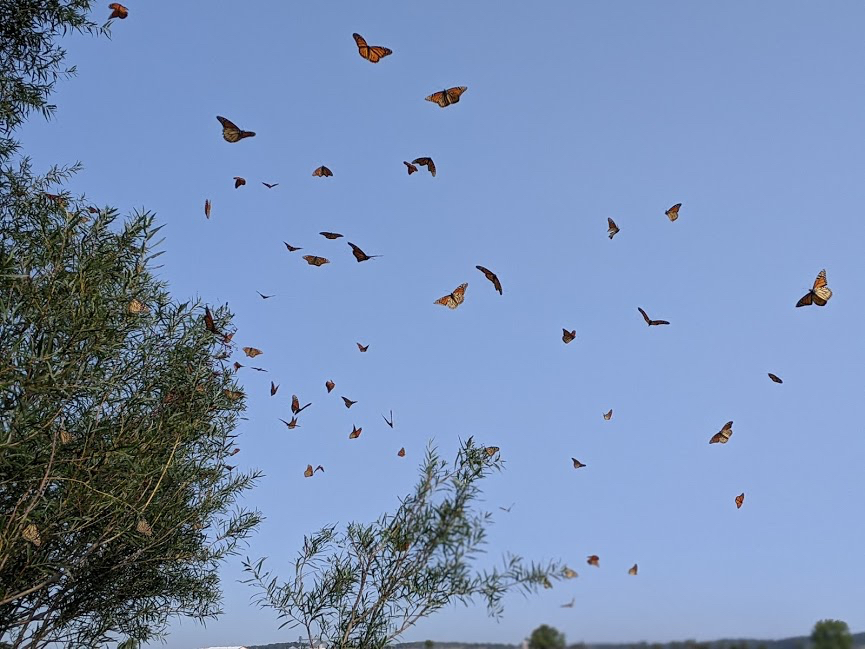
Monarch butterflies find sanctuary at the Riemers farm – trees for resting in and clover for energy.
Nathan: This is going to sound like a weird question. Do the animals seem happy? Or is that completely anthropomorphic?
Jen: I think they’re happy. The sheep, when they get led into a new paddock, they’ll like literally leap, even big nine-, ten-month old lambs. They’ll still do that. They’re happy.
Bryce: Our cattle especially are. They’re happy now because they’re healthy. They’re happy. They stay healthy. They’re shiny. They’re gaining weight and they don’t beller. Cattle beller when they’re hungry. They’ll complain.
Nathan: “Beller?”
Jen: It’s not like a moo. It’s like a scream. Turkeys will make noise when they’re happy, but generally a quiet animal is a happy animal. If you have a bunch of noisy animals, they’re upset about something.
Nathan: So speaking of the livestock being happy, are they healthy? I’ve heard that with rotational grazing animals stay healthier. Is the case for your cattle?
Bryce: Absolutely. My dad used to have a regular vet who would always come. We had to have the vet this year twice because of some pink eye. Everybody struggled with that this year, but it was only 20% of the herd. Other than that, we have not had any vet issues in the last year.
Jen: Sheep tends to get parasites. We have breeds that are pretty parasite-resistant, so we don’t have to deal with that as much. We move them every three days, especially when it’s hot and humid in the summer, because that’s the parasite cycle. Otherwise they could go back into the same grass and ingest the same parasite that they’ve pooped out. We are very good about keeping them ahead of the parasite cycle so they’re not going to reinfect themselves. Every sheep or goat carries a small load of parasites pretty much no matter what. So movement is key to animal health. And that’s why we were a little late to this interview – we were moving sheep.
Nathan: You have been living on the edge, trying new things, transitioning the farm, raising kids all at the same time. Have you learned things about the faith and has your faith grown because of the way you farmed?
Jen: Well, honestly, part of what I’ve learned, and I’m not going to articulate this well, has been endurance. It’s been a long stretch. There’s been a lot of blessings and a lot of moments where it’s like, “Yeah, God, this is what we are meant to do, and this is what we need to do.” And other times I have literally said, “I really don’t like farming today. Like today really sucks. Things are not going right.”
I say it to myself usually or out loud if I’m alone. It’s Murphy’s Law. It seems like when there’s a rough stretch, it is like all at the same time and it’s hard. But there’s not ever a thought of “I’m done” or “We need to do something else. I give up.” That’s kind of from faith. I’ve struggled at times recently. It’s like, “This is hard. I’m not feeling it.” But we keep moving and keep doing. We move forward because that’s what I want to do and what I know to do. That’s not profound.
Bryce: Being on the edge can be lonely. There’s not a lot of fellowship out here on the edge, which makes us feel like pulling everybody else closer to the edge and saying, “Why aren’t you out here taking more chances?” You know we’re dealing with people that most Christians don’t deal with, whether it’s a business or neighborhood or in town hall meetings and with customers. So we have connections to so many people. It’s a big opportunity to influence, whether it’s our social media followers or through our newsletters.
As far as the faith, there’s a chance to demonstrate it every day. Before we were doing this, when we had regular jobs and went to regular church, we would hear stuff in church and wonder if we’d ever get an opportunity to do that with somebody. Now, there are situations with people in our lives where we can demonstrate what we believe.
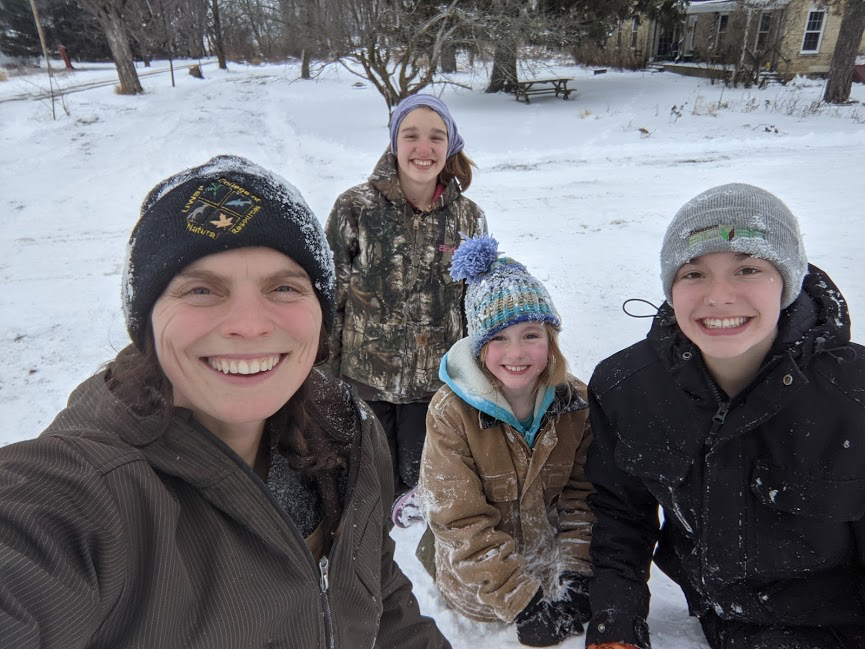
One of the ways God’s love has been expressed through the Riemer family has been the way they have made Anastasia (on the left) part of their family when she needed both work and a place to know love and family connection.
Nathan: Psalm 23 talks about the Lord being our shepherd, and Jesus referred to himself as the good shepherd. You have sheep. Does raising sheep make you think differently about when God compares us to sheep?
Kalena: When the Bible talks about how the sheep follow the shepherd, it really is true. And it’s kind of cool to be able to compare that to what we see every day.
Jen: Well, Ellie is really the shepherd of our sheep, and they will respond to her differently than they will to anyone else. We don’t even call them, because if she calls them in a loud voice, they will be like, “Oh, that’s where we go!” It’s just pretty cool. They know her differently from the rest of us.
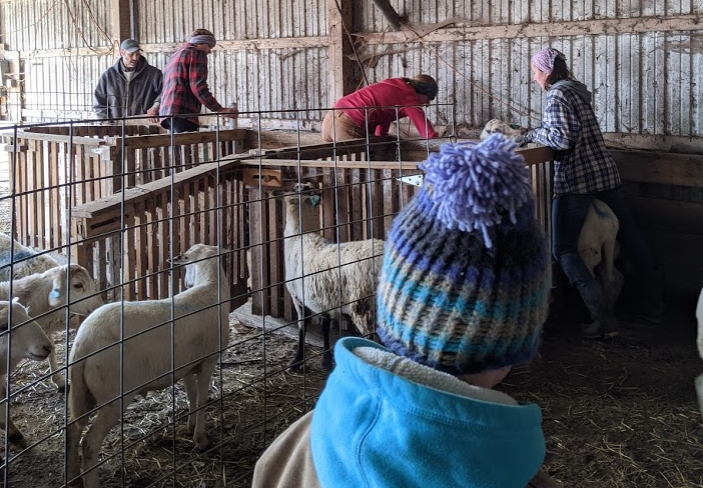
The Riemers sort sheep as a family.
Nathan: One of my favorite Christian authors is Dallas Willard. In The Divine Conspiracy, he talks about why the early Christians called themselves the Way and what Jesus was about in his life. He was trying to help us understand how the universe really works. God put certain things in place and certain ways of living. And if we’re in alignment with God, even in a broken world, that will bring greater harmony than if we go against God’s pattern, the framework he’s put into the universe. And so one of the things that it’s occurred to me is that with rotational grazing you’re essentially mimicking the pattern of how the natural world works and when you do that, you get healthy animals and healthy food. We don’t have to fight against the universe. We can work with it, if we’re creative and we’re willing to put in some extra effort.
Bryce: Yes, the spiritual and the natural can all line up. You don’t have to fight the system, but the system we do have to fight is the economic system. If it just paid a farmer well enough to be able to go do it (the sustainable way), then everyone would do it the way it’s designed to be done. But right now it’s just hard to do that.
Nathan: What temptations do the conventional farming system offer that make it hard to go the way you’re going?
Jen: Crop insurance – guaranteed prices for things. You can grow a losing crop year after year after year and still make money from the government. It’s mind-blowing really. It’s easier. You buy your seeds from the feed guy. You buy your fertilizer from the fertilizer guy, and you take everybody’s recommendations. You can even hire somebody else to drive the tractor to plant it.
But we’re making hard decisions most days on either production or financials or just when to make hay and bale it. It’s constant, which is not the case with the commodity farm.
Bryce: It’s not farming anymore. Creating jobs and creating work – no, you’ve got to have more technology and bigger machines, so you don’t have to have more jobs. And now it’s CBF – corn, beans, Florida. You don’t want to have to be tied down to all these animals and the old ways of doing stuff.
The temptation used on me to do conventional farming came from the Confined Animal Feed Operation (CAFO) people. When they first were getting to know us and first made their pitch they said, “Why don’t you just sell us your corn silage (that gets harvested a lot earlier than fuel corn)? And then you’re done for the year and you can go buy your Corvette.”
How could I refuse the allure of being done early and Corvette shopping, instead of doing all this other work?
Jen: Which also implies that they had all the answers and they were actually going to pay a fair wage, which we all know is not really the case.
Nathan: So since you mentioned the CAFO, can you share how the struggle against the CAFO operation that has ultimately been built just down the road has challenged your faith? (By way of context, the Riemers, with Jen taking the lead, were part of a years-long community effort to try to stop a dairy factory farm from being built less than a mile from their farm. They were ultimately unsuccessful. Sadly, our government tends to serve business interests far more than long-term community interests. Here is an article that explains more about the issues surrounding diary CAFOs in Wisconsin.)
Bryce: The CAFO is a chapter of our lives that that changed our lives in big ways. It impacted our faith. We were here farming, and, at least in our opinion, we were Christians. And when they came in, it actually rattled us to the point where we thought that somebody else’s bad decisions might prevent us from being able to always be here farming and just be Christians farming.
That’s when the faith became real, the Bible came alive. Because the ideas of going through these tribulations and being that affected by other people’s negativity/stupidity made us have to face the fact that we were holding onto this farm too tightly. It was maybe before God. And then we realized that if this is God’s, he can take it from us, just like he gave it to us, then we need to give it up to God, consecrate it, and say, “It’s yours. If you want us to farm here, we will. We will do it in a way that follows your calling and gives you the glory. And if not, we’ll go do something else.”
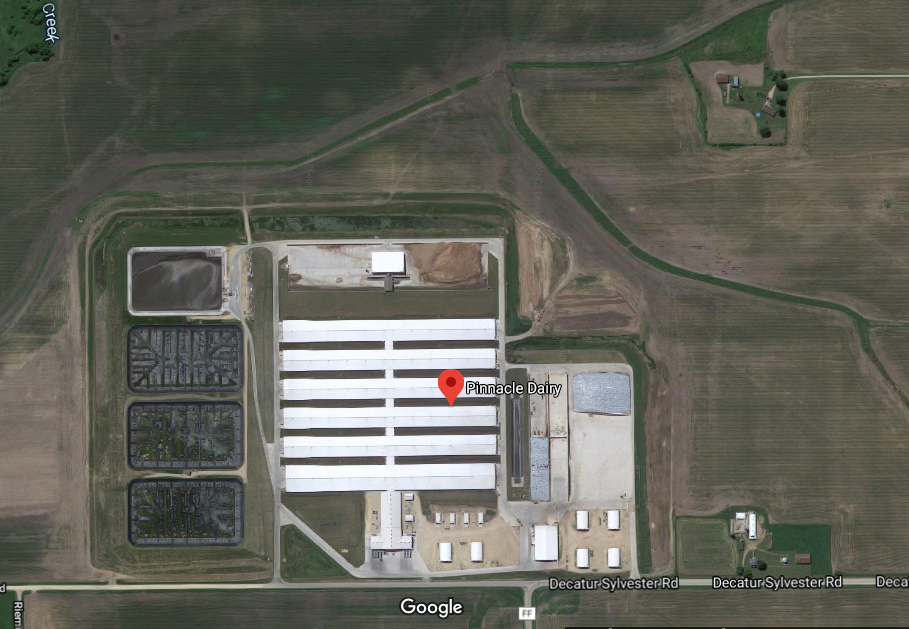
This is an aerial photo of Pinnacle Dairy, the dairy CAFO right down the road from the Riemer Family Farm. Six thousands cows will ultimately be housed inside the long buildings. The rectange at the top left is a manure pit which government authorities are allowing to be uncovered.
Nathan: So you had that peace of mind even as you, especially Jen, were leading the community fight against it.
Bryce: Well, it took me a little while to get there. We really had anguish.
Jen: It took me a longer while. It was pretty annoying, actually, when Bryce got the vision a lot earlier than I did. It felt like giving up in that I’m holding so tightly to this thing that I must keep holding tightly to. And it just got to the point of exhaustion. And I finally it was like, “Ok. Well, I’m obviously not in charge here, so this needs to be held loosely, and we’ll move on from here.”
Bryce: It’s kind of confusing at times about how to know how hard to fight for something that you believe is right versus God’s will is going to come through in the end no matter what. It was hard because Jen was the leader of this group. So she had people out there, and so she felt pressure to be that leader and keep going. Yet we knew that God was in control, but the people that she was leading didn’t really know that or believe that. So it was really hard.
Jen: Especially at the end when the greater tension ended up being between our people and what the next steps ought to be. That was the hardest part. It was infighting. People had really good intentions. But they just disagreed about when to say enough is enough and we need to move on or when to bet the house and get a second mortgage and hire a bigwig lawyer and take the CAFO owners to court.
There was a lot that went into that decision, but that was the hard part at the end. Logically, taking it to court didn’t make a lot of sense. Honesty, we were two, three years in (I don’t even know – it was all a blur), and at that point I just saw that we were not going to win. And I was like, “I cannot do this for the next five years.” Because that’s what it would have been. My family came first. My faith came first. I would have lost the farm by doing that for five more years.
Bryce: I was trying to encourage her by saying that it’s a victory if we stay true to Jesus and have a good witness to people and make people wonder why we’re not upset no matter what, whether the CAFO farm comes in or not. The farm coming is not a defeat. The victory is staying true to what we believe in and not losing our integrity. And Jesus is in control of the ultimate destiny of that farm.
Nathan: At the same time, it’s a fact that the laws and economic system of our country enable that CAFO and other CAFOs to do what they do to communities, animals, and God’s earth. That’s just one thing that make me question whether we are truly a Christian country. The prophets in the Old Testament talked a lot about how the rich and powerful did awful things. The CAFO and the law system that enable CAFOs to go in are examples of our society being run by the rich and powerful against the interests of the vulnerable who God really cares about.
Jen: Absolutely. And it’s done under the guise of them being the good guys doing the right thing. The ones that write the statutes are the staff of the Department of Natural Resources. They hand CAFO owners everything that they need to get these things built. And it’s like, “Wait a second! You’re the guys that are supposed to be protecting rivers and my drinking water, but you’re not.” I don’t say that to diminish all of the DNR staff and all of the things that they do. That’s the reality – the job of the DNR is to permit CAFOs. Who decided that?
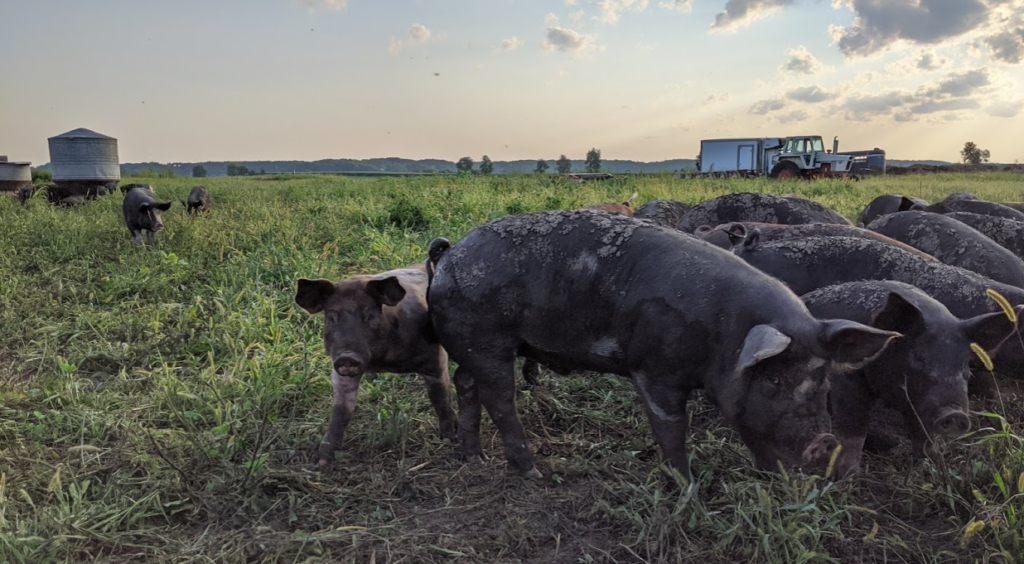
Pigs on pasture at the Riemer Family Farm. Pigs, which are highly intelligent animals, do not get the opportunity to enjoy fresh air and to express their “pigness” in factory farm buildings of CAFOs.
Nathan: I’ve heard a number of people call farming a calling like some people feel called to be pastors. Do you feel like farming is a calling for all of you as a family?
Kalena: I, at this point, feel very called to mission in the future. Maybe I could help people farm this way in other countries and still be a missionary.
Bryce: Well, I’m third generation so it’s not like I heard a calling and went to be a farmer. I would have to hear a pretty strong calling not to be a farmer.
Elli: You did not want the farm in college. It was a calling when you woke up to it.
Bryce: Yes. But ultimately selling the farm and letting it go would have been a tough decision. I do feel it’s where I’m supposed to be. I feel more in God’s plan and will now than I ever have. This opportunity to farm is the culmination of all the other things I’ve been doing.
Jen: Well, I think it’s a calling that’s developed. I don’t think one of us could say there has been a strong moment. It’s been a road. It’s been a journey. We’ve kind of planted these seeds. We can’t go back and flick them out of the ground.
Elli: I feel called to protect the environment, probably due to this farm, but it wouldn’t have to be through farming.
Nathan: Have you had spiritual experiences while farming?
Jen: I’d say the roosting of monarchs is pretty spiritual, actually.
Elli: And there’s like hundreds of finches across our road right now because of the sunflowers we planted. It’s crazy to see them all fly.
Bryce: Since school has started this year, we’re all homeschooling. We’re farming together every morning, and we go out as a team and a family and do all the work and then school the rest of the day on good days. My point is that we start the day together for the first time as a whole family. We have a meeting every morning, and we plan the day. We also do devotions, read, and pray together. It’s been really a great opportunity for our family to stay together. I guess that’s not technically while we’re farming, but it’s because of farming
Kalena: It’s happened a couple of times where it’s cloudy but then there’s an opening, and it seems like the sun is showering down right on our farm. And that’s really cool. I kind of think of it like God is just looking down on our farm. And just to look out over the pasture sometimes – it’s like, “Wow! It’s beautiful to see what God meant the land to look like.”
Jen: For me, too, it is energizing to be with the life, the fundamentals of life. And I think that’s the thing with the butterflies and the finches. It’s like the wholeness of the system and the vibrancy. Especially in contrast to our neighbors’ fields right now that are totally bare, because they’ve got corn silage. So it’s bare dirt when everything could be bright green. It’s just this contrast.
I’m an emotive person, so I see that and I’m just like, “Oh, this is horrible!” And then I got into my field and it’s like, “Butterflies! This is nice.” It’s energizing. A creation worshiper would worship that scene, but we worship because it’s a gift from God.
Nathan: Could you give me a brief overview of how the land has been transformed over time through your farming?
Elli: I remember when it was corn and beans. The field would be barren for like half the year. Now there’s always something green or very colorful on it. We never have bare soil anymore. We make hay off of it and that’s pretty much the only thing we do. So we’re not planting or harvesting anything really either. We’re always covering the ground.
We’re surrounded by bare fields (their neighbors’ fields) right now. Dust is flying off of it. There’s no more top soil all around us.
Bryce: My dad had beef cattle, and so he grazed them. He had a cow-calf herd and finished out some cattle on grain. But he didn’t rotationally graze. So the pasture was really short in a lot of areas and really tall and weedy in the others. It was 55 acres, so the cows and calves would walk from one end of the field to the other and back to the water and leave these paths everywhere. So there were ruts and whatnot from which the water would run off.
And so that was the pasture. And now there are no cow paths. There’s no weeds. And the tussocks are only where we want them to be in the old waterways and are providing frog habitat
And the whole farm now looks like that. My dad used to have corn and beans, which he would no-till, so there was no tillage going on, but it would involve spraying weeds. And then there were the alfalfa fields, the hay fields. There was always a constant battle with weeds.
And that’s one of the biggest transformations we noticed this year. Where are all of the weeds? Where are the thistles? Struggles we’ve had in the past just weren’t there this year.
Jen: And we’re running the cattle on another 129 acres. There’s no weeds. We do have some up north where the pigs are, because they’re pigs. But it (the lack of weeds in cattle pastures) is amazing.
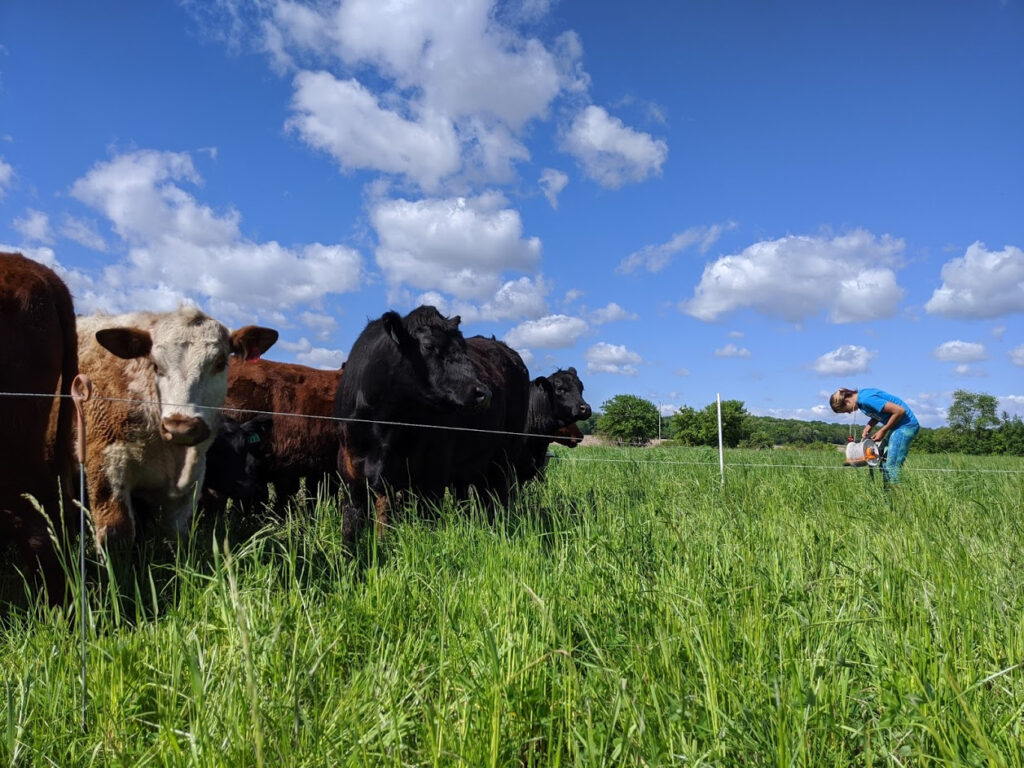
Elli preparing to move cattle herd from one paddock to another. By rotationally grazing cattle on a regular basis, the cattle get a heathier diet and the vegetation has a chance to recover while also providing habitat for other living things of God’s earth.
Nathan:, I’ve often felt alone in my conviction that Creation matters, that it is part of the overall story told in the Bible from Genesis to Revelation. Have you felt alone at times in that conviction as well?
Elli: No church people helped in the CAFO fight. There are environmental people and church people, and the church people don’t really care. Our pastor is kind of getting there a little bit.
Kalena: And during the CAFO fight, there were other people you could talk to who shared the passion for the land, but for me it was mainly because of faith why I didn’t like the CAFO coming in, which I couldn’t really talk to with those people without being weird or being shut out again.
Jen: It was definitely two groups of people. I often get frustrated with every church potluck being full of really horrible food raised in really horrible ways. And the kids get all sorts of little plastic toys made in China by other kids. How can we be so passionate about our faith and not see this whole piece of discipleship?
Bryce: Well, I think this year it’s very clear that it’s political. You didn’t really think about it as much before, but everything is drawn as a line in the sand. Christian churchgoers have to be Republicans, and Republicans are supposed to not be environmentalist. So we have to close our eyes to that whole part of it.
Nathan: What advice do you have for Christians who aren’t farmers in terms of food and farming. What should they think about the food that they eat?
Kalena: They should think about what they’re buying. If they really want to live out their faith in every aspect, they have to think about every aspect.
Elli: Just start thinking about it. That will get you a whole lot farther than you are now.
Jen: I think the word I was looking for before was integrity. If I proclaim Christ, but I do these other things that are not Christ-like then I think we need to think about that more. I think that there are, like Bryce is saying, certain issues that have this elevated priority over the big picture of whole planet health because that’s not what we’re supposed to talk about. But I think that we neglect and we leave off the table this whole depth of what we can be as Christians when we limit our issues that we’re going to care about to abortion and welfare or whatever.
We need holistic management in our hearts.
Bryce: Everything that people eat was alive. And so people need to think about what their food came from. Did it live in a way that it was created to? If they can just start asking that question, they can decide for themselves where to come up with budget changes to find the money to pay for food that is God-honoring.
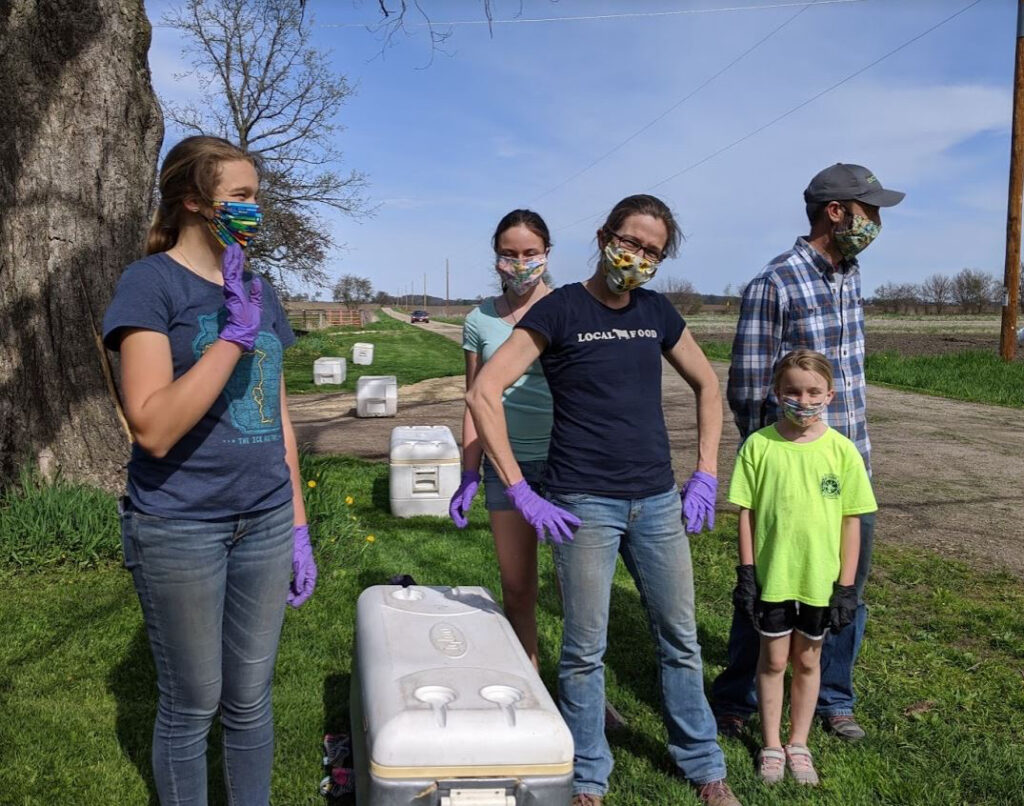
During the pandemic, many people have had new appreciation for the value of healthy food that is also good for God’s earth. Demand has been strong for the Riemer’s meat. They’ve made available online ordering and on-farm pickups.

